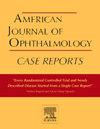Acute depression leading to a suicide attempt following successful cataract surgery that restored vision in a legally blind patient: A case report from Tanzania
Q3 Medicine
引用次数: 0
Abstract
Purpose
Cataract surgery is a common and effective procedure for restoring vision, yet it can sometimes lead to unexpected psychological challenges, particularly in legally blind patients. This case report highlights the need for pre- and postoperative psychological assessment and support for some cataract patients to prevent potential mental health crises that may arise if they feel abandoned or unsupported after recovering vision.
Observation
We present a case of a legally blind 72-year-old male who, two weeks after a successful cataract surgery, developed acute depression that culminated in a suicide attempt. The psychological distress was possibly triggered by the sudden withdrawal of family support, leaving the patient feeling abandoned and overwhelmed by the abrupt expectation of independence.
Conclusion
Despite the success of cataract surgery in restoring vision, some patients may face significant emotional and psychological challenges. This case underscores the importance of holistic patient care, including mental health evaluations and psychosocial support, particularly for legally blind patients undergoing visual rehabilitation.
一名法定失明患者白内障手术成功恢复视力后,急性抑郁症导致自杀企图:坦桑尼亚病例报告
目的白内障手术是恢复视力的一种常见而有效的方法,但有时会导致意想不到的心理挑战,特别是对于法定失明的患者。本病例报告强调了对一些白内障患者进行术前和术后心理评估和支持的必要性,以防止可能出现的心理健康危机,如果他们在恢复视力后感到被遗弃或得不到支持。我们报告一位72岁的法定失明男性患者,在白内障手术成功两周后,出现急性抑郁症,最终企图自杀。这种心理困扰可能是由于家庭支持的突然中断而引发的,使患者感到被抛弃,并因突然期望独立而不堪重负。结论白内障手术虽能成功恢复视力,但部分患者可能面临重大的情绪和心理挑战。这一案例强调了全面病人护理的重要性,包括精神健康评估和社会心理支持,特别是对接受视力康复的法定失明患者。
本文章由计算机程序翻译,如有差异,请以英文原文为准。
求助全文
约1分钟内获得全文
求助全文
来源期刊

American Journal of Ophthalmology Case Reports
Medicine-Ophthalmology
CiteScore
2.40
自引率
0.00%
发文量
513
审稿时长
16 weeks
期刊介绍:
The American Journal of Ophthalmology Case Reports is a peer-reviewed, scientific publication that welcomes the submission of original, previously unpublished case report manuscripts directed to ophthalmologists and visual science specialists. The cases shall be challenging and stimulating but shall also be presented in an educational format to engage the readers as if they are working alongside with the caring clinician scientists to manage the patients. Submissions shall be clear, concise, and well-documented reports. Brief reports and case series submissions on specific themes are also very welcome.
 求助内容:
求助内容: 应助结果提醒方式:
应助结果提醒方式:


